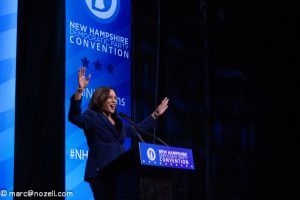Indians have rarely been a talking point in a U.S. presidential election. That has changed this year. After Joe Biden picked Kamala Harris, partly of Indian heritage, as his vice presidential candidate, President Donald Trump hit back with a campaign ad that featured Prime Minister Narendra Modi.
In the days that followed, both the Democrats and the Republicans have been courting Indian-American voters with explicit references to their identity. Harris has spoken at length about how her Indian grandfather shaped her progressive views over the course of long seaside walks in Chennai. Meanwhile, Trump presided over a rare naturalization ceremony at the White House, featuring – among others – a sari-clad Indian software engineer.
All this bonhomie, however, conceals a significant amount of political complexity underneath. India’s diaspora has long been a powerful lobby of support for Indian foreign policy in the United States. Yet, the Indian diaspora across the West is today deeply polarized across all lines – from religion to Hindu caste and even age.
Much of this has to do with the recent radical changes in Indian politics, each of which has thrown India’s national character into a state of turmoil: the abrogation of Kashmir’s autonomy and its subsequent lockdown, the controversial Citizenship Amendment Act (CAA) and the riots that followed in Delhi, and the aggressive Hindu nationalist politics surrounding the Ram Temple in Ayodhya.
The rise of Hindu nationalism in India has been aggressively welcomed by powerful Hindu-American groups in the U.S., but not everybody has been so happy.
In the aftermath of the events of the past year, sections of the Indian diaspora – especially younger immigrants, anti-Hindutva activists and Muslim groups – staged widespread protests in front of consulates and embassies across the Western world. Soon enough, the Democrats joined in. Some of the more prominent Democrat critics of the Modi government have, in fact, been Indian-Americans, including Congresswoman Pramila Jayapal and Congressman Ro Khanna. Kamala Harris herself spoke out against the Indian Foreign Minister S. Jaishankar after he decided to boycott a meeting with Jayapal.
If all this wasn’t enough, in recent times even caste divisions have started coming to the fore. In June this year, the California Department of Fair Employment and Housing filed a complaint against Cisco for allowing discrimination against a Dalit (lower-caste) Indian-origin employee in its headquarters. This is the first time a civil rights case has been filed by a U.S. government entity on grounds of caste discrimination and the case has shed spotlight on an issue that one rarely hears about in that country.
In 2018, Equality Labs conducted a unique survey of 1,200 South Asians in the U.S. to learn about how caste divides the diaspora. The results were telling: 26 percent said that they had experienced physical assault because of their caste, while 59 percent reported caste-based derogatory jokes or remarks directed at them.
Progressive Indian-American activists have long criticized the Hindu nationalist discourse for its caste bias. And they have now taken that movement to American politics. Some members of the Indian diaspora recently went after Kamala Harris, after a 2003 interview of her mother Shyamala Gopalan resurfaced. In the interview, Gopalan allegedly alluded to the superiority of their Brahmin (upper caste) status.
All these divisions within the diaspora have not gone unnoticed among American politicians. Last month, the Republicans launched four separate coalitions to woo different sections of the Indian-American vote bank, including three specifically for targeting Hindus, Sikhs and Muslims separately.
Regardless of the outcome of the upcoming presidential election in November, the political fragmentation of the Indian diaspora along identity lines has significant consequences for Indian foreign policy. India’s diaspora has long been New Delhi’s greatest and most influential asset in the West. But as it splinters along lines of religion, caste and age – driven by highly polarized views of the Modi government – it will become much less cohesive and effective as a lobby for Indian foreign-policy interests.
Even New Delhi’s own interests now stand split in Washington. While the Modi government has been visibly friendlier to Trump than to the Democrats – owing to the former’s silence over human rights concerns in India – Trump and his white nationalist base have so far been terrible for India’s interest in ensuring easier immigration policies. Despite the naturalization ceremony at the White House, Trump has repeatedly attacked Indians for taking away American jobs and H-1B visa restrictions have disproportionately hurt Indian professionals.
On the other hand, while the Democrats will likely ease some of these restrictions if they come to power, some Democratic politicians will be much harsher on Hindu nationalism even if Biden himself chooses to be personally restrained as president.
India’s identity politics have reached its diaspora in the U.S. and that is not good news for New Delhi’s long-term foreign policy interests.

































